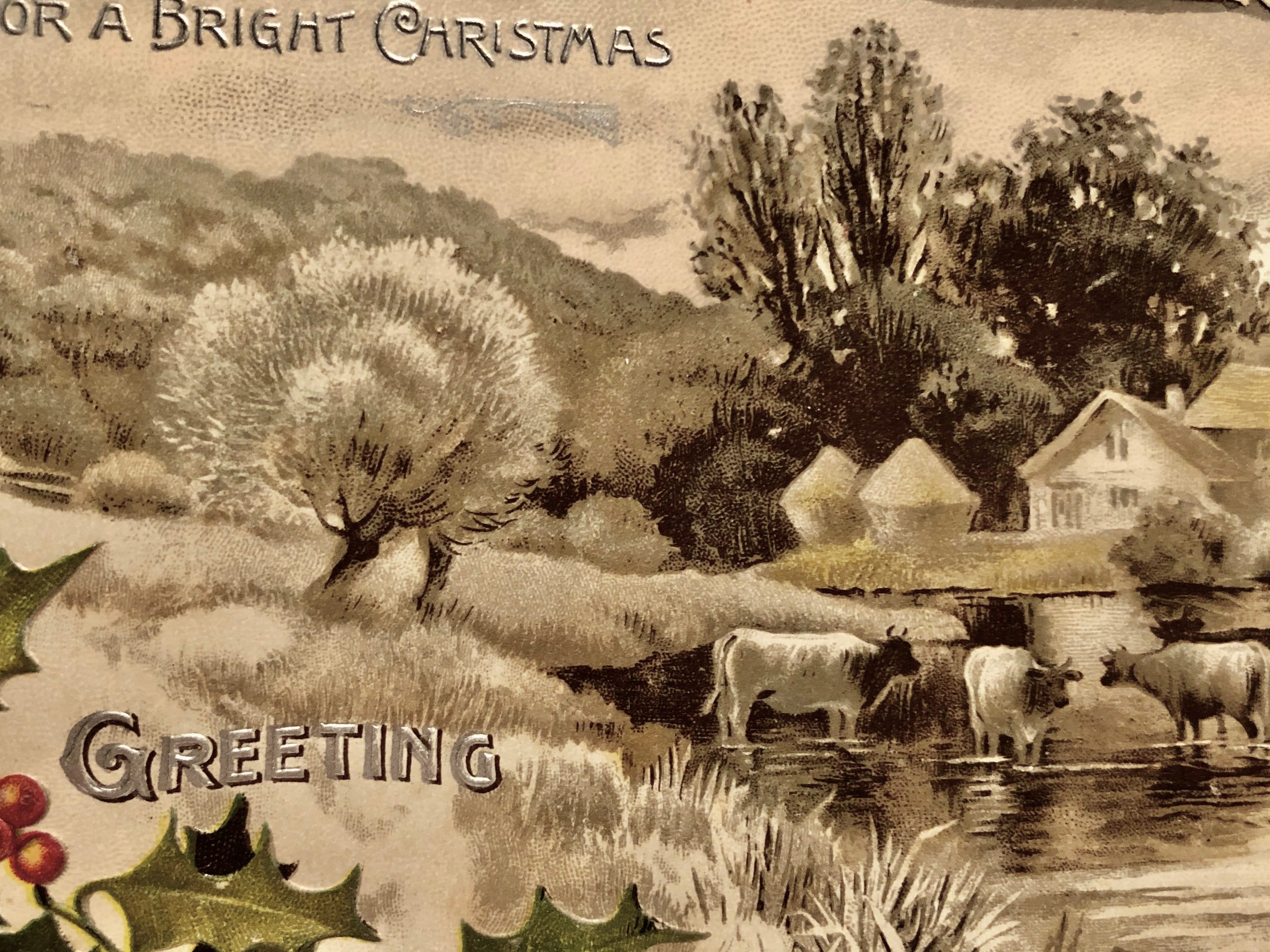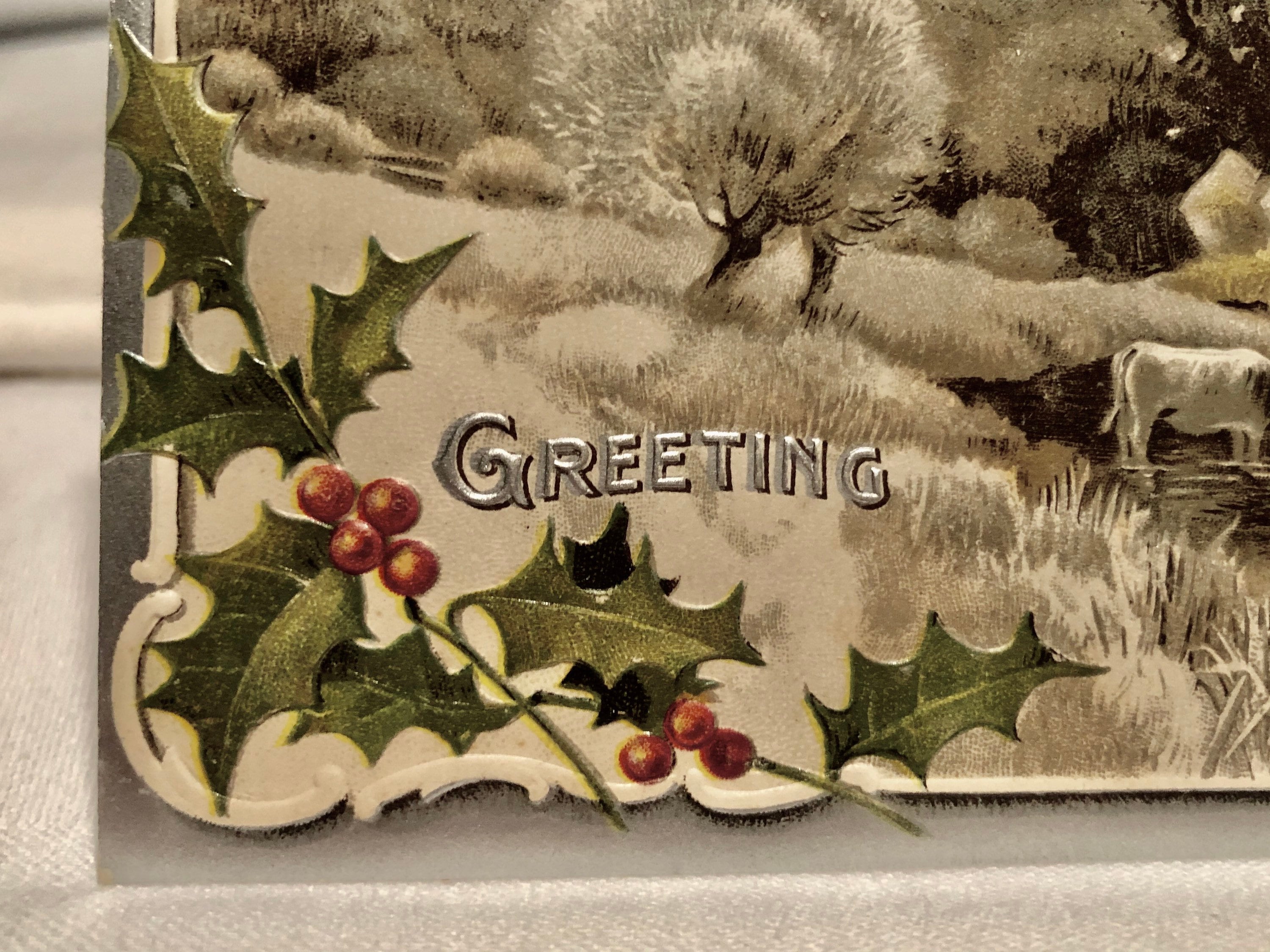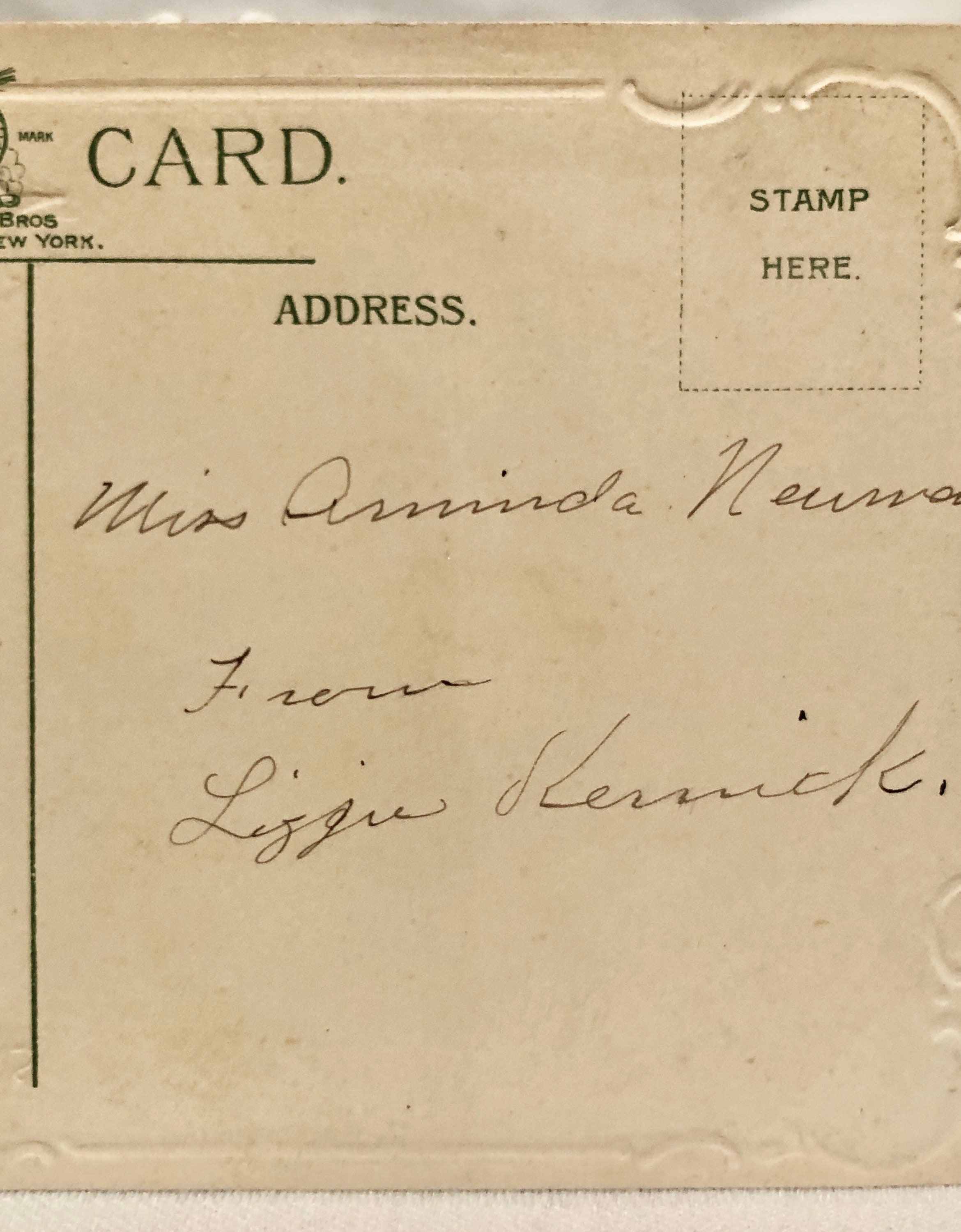Vintage Victorian Christmas Postcard, Davidson Bros, London/New York Series 753-1
$5.00
This vintage victorian postcard was made by Davidson Bros, London/New York Series 753-1
It depicts a welcoming country homestead with cows quietly grazing
The boarder is a silver with white scroll detail and sets off the sepia tone of the scene
Sending Greetings for a Bright Christmas
It is in beautiful condition - no rips tears or bends
It has not been postmarked and is signed to the receiver Miss Neuman From Lizzie Kerrick
Deltiology, the official name for postcard collecting, is thought to be one of the three largest collectable hobbies in the world along with coin and stamp collecting. Postcards are popular because of the wide range of subjects, with just about every subject imaginable being at some time, portrayed on a postcard. History itself can be tracked on postcards, from historical buildings, famous people, art, holidays and more.
The Years from 1900-1918 are known to collectors as the "Golden Age of Postcards" and during this period, people sent postcards for any occasion.
At the end of this period in time, the hobby of collecting picture postcards became the greatest collectible hobby that the World had ever known.
Previously and during this period most of the postcards were still being printed in Europe, especially by the Germans whose printed methods were the best in the world. These cards exhibited the brightest colors and the finest artwork. Some of the most prolific card artists moved to Germany. Postcard collecting became a public addiction.
My favorite postcards are the Holiday cards- Christmas, Easter , Valentines Day and my absolute favorite - Halloween!
Some of the more popular vintage Halloween postcards are those signed by the artist--such as Clapsaddle and Brundage cards. Postcards, the precursor of the standard modern greeting card, were prolific for Halloween beginning in the late 1800s. Generally, these can be found for as little as $10.00 to $20.00 on up to several hundred dollars for rarer cards--especially those that are mint and unused. Some become very collectible too because of the writing on the back of the postcards.
Halloween celebrations of yesteryear were occasions for hopeful romantics to try their fate in love, and were commemorated in rhymes, chants, trials and tests.
For early twentieth-century romantics the harvest garden was especially ripe with fortune-telling symbolism.
In 1843, a wealthy British man named Sir Henry Cole had so many greetings to send, he couldn't hand write them all. So he had a card made showing charity to the poor, and the Christmas card was born. Subsequent postcards produced by publishers from the 1870s until World War I featured everything from nativity scenes to families around the Christmas tree. Early cards were lithographed and often adorned with silk, lace, and satin. Between 1898 and 1918, the golden era of postcards, Christmas postcards were the most popular vehicle for conveying holiday wishes.
Christmas postcards featuring Santa Claus or Saint Nicholas are the most collectible, particularly the early German chromolithographed and embossed postcards featuring Santas in colors other than red. American Santas with black faces are also very popular with contemporary collectors. The German version of Father Christmas, also called Weilnachtensmanner or Belznickel, can be found in fur-trimmed robes of white, yellow, orange, black, and gray, and these cards are particularly desirable. This thin, stern mythical old man brought treats to well-behaved children. He sometimes is accompanied by an angel or the Baby Jesus, whom he holds in his arms.
Unfortunately the threat of war saw a quick decline of imported cards and WWI brought the supply of postcards from Germany to an end. A lower quality of cards were coming from England and from publishers in the United States. Due to the war, influenza epidemics and the poor quality of cards brought and swift end to the American postcard hobby. The telephone quickly replaced the postcard as a way to keep in touch and thus was the end of the "Golden Age" of postcards
Shipping from United States
Processing time
1-3 business days
Estimated shipping times
- United States : 2 - 3 business days
I'll do my best to meet these shipping estimates, but can't guarantee them. Actual delivery time will depend on the shipping method you choose.
Customs and import taxes
Buyers are responsible for any customs and import taxes that may apply. I'm not responsible for delays due to customs.
Payment Options
Returns & Exchanges
I gladly accept cancellations
Frequently Asked Questions
Are these new items?
All items in my shop are vintage and antique meaning previously owned, loved and used.
I will disclose any condition issues to the best of my ability in the item description and ask that you review pictures and description prior to purchase.
Please contact me - I'll be happy to clarify and answer any questions.
Do you accept returns?
I do not accept returns or apply refunds
Please review item description and pictures prior to purchase or contact me with any questions
I’ll gladly provide any additional
information
If it is agreed upon between the seller and buyer that an item will be returned,it is the responsibility of the buyer to pay for return shipping. Once the item is received to the seller a refund of the purchase price only will be applied to the buyers account.
I ship quickly -1-3 business days-so I will only except a cancellation within 24 hours of purchase since I will be preparing the item for shipment in order to expedite your purchase
Why are shipping costs so high?
The shipping cost is determined by the postal service which is described below Due to the various sizes and weights of the items in my shop I unfortunately cannot offer free shipping
I utilize the USPS for shipping all packages and have found them to be the most economical and reliable
USPS has discontinued Regional Rate Box prices. This means that this mail class is no longer available
USPS uses Cubic Pricing rates which are determined by package dimensions and distance traveled instead of weight








